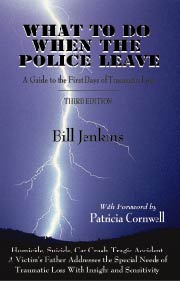
In 2015, my beautiful and amazing grandmother, Marie Rose Belcastro, was still living in her own home, independently. At 94 years young, she was as excited as ever about her church and prayer groups, her family and friends, and her cooking. She also developed a love for fly-fishing at age 90, which she continued to nurture. My grandmother was full of energy, love, laughter, and light, and showed no signs of slowing down. Anyone who ever met her instantly fell in love. She was quick with a joke, even quicker with a laugh. I thought for sure she’d live to 100.
On March 31, 2015, my grandmother was brutally murdered in the home her father built, by 15-year-old neighbor Jacob Larosa. So grisly were Larosa’s crimes against my grandmother (including attempted rape) that Judge Wyatt McKay wisely sentenced him to life plus 31 years in prison, without parole.
Larosa’s long journey from suspect to convicted felon took three and a half years, methodically winding its way first through the juvenile court system, then ultimately to Judge McKay’s courtroom in downtown Warren, Ohio. Our family left the courthouse that day of sentencing in October 2018 with a deep sense of gratitude for the people of Trumbull County, especially Chris Becker, who prosecuted the case.
In prison, Larosa continues to enjoy excellent legal representation, courtesy of Ohio’s taxpayers. In fact, the Ohio Supreme Court just heard another of his appeals. Thankfully the prosecutors in Trumbull County are top-notch (as are the Niles police).
Sadly, Ohio’s legislature and governor undid much of the successful prosecution of Larosa. With the signing of Senate Bill 256, the leaders in Columbus decreed that just about anybody in prison for life who committed their crimes as juveniles must be given a chance at parole. The law applies retroactively.
This bad law will result in future crimes against Ohioans. It also puts survivors who were previously comforted by life sentences into a new kind of hell where we must now prepare for a future of parole hearings and release possibilities. Before, we had closure, backed up by steel bars and armed guards. Now we face the possibility of a freed Larosa, wondering if we’ll be safe.
This law is a violation of the trust we are all asked to put in our judicial system. Who knew that a simple senate bill (there were 255 of them, presumably, before this one) can upend countless lives – lives that already were filled with anxiety, depression, and other brokenness at having lost our loved ones to murder.
In light of Larosa’s criminal history, better use of the legislature’s time would have been to find a way to better punish and track juveniles when they escape from a detention facility, as Larosa once did. Or, they could have reformed domestic violence laws so that when a juvenile puts a sibling in the hospital, as Larosa once did, he can face real justice.
The system worked for my family when local prosecutors and a local judge did their duty, guided by law, and gave Larosa the harshest penalty allowed under the law. The system worked on the local level, yet the governor and legislators thought that’s the part that needed fixing? That we need to go easier on juvenile murderers? This unnecessary change reads like a nightmare news story from Gov. Gavin Newsom’s California. What happened to boring, predictable, tough-on-crime Ohio politicians?
Supporters say S.B. 256 is about rehabilitation. I believe in a God who does give second and more chances. I wrote to Larosa a few years ago, telling him that God loves him and wants to heal his mind and spirit. My grandmother was a woman of deep faith, and I know she’d share that good news with Larosa if she could. God can and does forgive. I can forgive. But this wonderful fact does not absolve Larosa of the consequences for his actions. Only God (and S.B. 256 apparently) can do that.
There are people behind bars who are freer in spirit than you and me. That’s because true rehabilitation is never determined by incarceration status. It’s the other function of prison that concerns me more. It’s the part about protecting innocent Ohioans from dangerous criminals. Have we forgotten about that part?
Holocaust survivor and psychiatrist Dr. Viktor Frankl wrote that human beings can endure much suffering, provided we are able to attach meaning to that suffering. I believe that my grandmother’s murder is meaningful so long as her killer is behind bars, unable to harm his family, mine, or yours.
S.B. 256 is a cruel slap in the face to victims, local judges, and prosecutors, and it must be scrapped. I’m no lawyer, but it seems to me that if you can’t add punishment to a criminal ex post facto, then you shouldn’t be able to punish survivors, ex post facto. Common sense isn’t so common, however, especially among career politicians.











